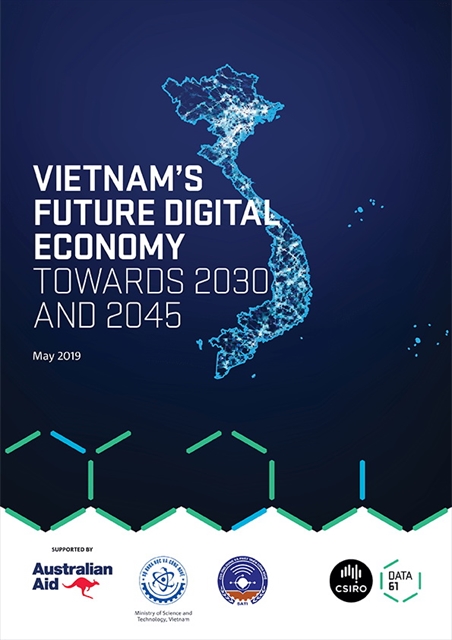 Economy
Economy


|
| The report “Việt Nam’s Future Digital Economy towards 2030 and 2045” provides economic modelling for potential growth scenarios. Photo courtesy of CSIRO |
HCM CITY — Risks and challenges must be identified during the digital transformation era to ensure that Việt Nam continues to grow and be prosperous, a new report has said.
The report, “Việt Nam’s Future Digital Economy Towards 2030 and 2045”, notes that much has already been done through the Government’s policies on 4.0 Industry such as cybersecurity, energy and digital skills.
The report was issued by Australia’s Commonwealth Scientific and Industrial Research Organisation (CSIRO) and Việt Nam’s Ministry of Science and Technology.
Dr Lucy Cameron, lead author of the report, said that Việt Nam, as one of the world’s fastest-growing economies, should carefully navigate a number of risks while undertaking digital transformation.
The CSIRO and Việt Nam’s Ministry of Science and Technology have proposed a list of possible actions to assist policymakers and leaders of industry.
Dr Võ Trí Thành, chairman of the Việt Nam Committee at the Pacific Economic Cooperation Council, said that political will was especially significant in carrying out digital transformation.
The country faces five main challenges in implementing such a transformation, according to Thành.
The most crucial is Government leadership, which will decide whether 4.0 industry is actually put into place or is just an empty slogan.
Legal regulations often fail to keep up with the country’s rapid rate of digitalisation. For example, enforcement of written regulations is often weak.
The country also lacks a sufficient number of people who can play leading roles in the digital transformation process.
Though Vietnamese students often gain high academic achievements, creativity and innovation are not their strengths.
The lack of a strong ecosystem for innovation and start-up businesses is another issue, while digital infrastructure is still at a very low level in terms of data and transmission speeds.
Priorities
According to the report, the first priority for the government is to foster development of ICT networks and energy security.
Without infrastructure, the digital economy cannot exist. Security of the networks and activity on them are both essential.
In addition, improving digital skills will be the key to unlocking the productivity benefits of digital networks.
Industry 4.0 and national innovation policies will give momentum to the adoption of digital products and services, as well as prepare the country to shift to a high-income economy.
According to the report, Việt Nam may be able to specialise in technologies that will help it “leapfrog” to much higher levels of productivity.
Taxation and regulatory reform policies will also help attract investment in the digital economy, experts say.
To create a mature digital economy, careful consideration of regulatory reform is needed as new technologies and business models will challenge existing regulations.
Nguyễn Đức Thanh, president of the Việt Nam Institute for Economic and Policy Research, said digital transformation would change the future of the country dramatically.
“Along with the Internet and social media development, the Vietnamese population will become better informed and well-off, pushing the government toward better governance,” he said.
Education is key to successful integration and digital transformation, he said. “Traditional education could be changed by other forms such as online education, home schooling and self-education.”
Launched in 2017, the report provides economic modelling for potential scenarios of growth for Việt Nam’s digital economy up to 2045.
It aims to serve as a strategic decision-making tool for leaders in government and businesses negotiating the new wave of digital innovation and the next phase of economic development.
The first report “Việt Nam Today”, which was released last year, examined the state of Việt Nam’s macro-economy and digital economy.
The present report, which was released last month, updates this research and examines the state of Việt Nam’s economy and digital economy in early 2019 with a main focus on the agriculture and manufacturing sectors.
The report is part of the Việt Nam’s Future Digital Economy project, an innovative joint venture between Việt Nam and Australia. — VNS




